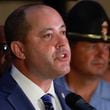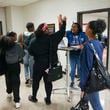DES MOINES, IOWA — The remnants of a massive winter storm and subzero temperatures greet Iowa Republicans as their state goes first in choosing a nominee for president in their unusual caucus meeting format.
Blowing snow and high winds made travel treacherous, forcing campaigns to cancel events scheduled for the usually frenetic final weekend before Iowans head out to caucus.
With temperatures on Monday expect to range from a high of 2 degrees below zero to a low of negative 18 degrees and the wind making it feel even colder, turnout now becomes a major factor. Trump’s biggest base of support comes from rural Iowa where people tend to live farther from their precincts and snow-logged roads will be harder to navigate. Supporters of Haley and DeSantis say their candidates could gain an edge.
But it’s more than snow and ice that separates the Iowa Caucuses from Georgia’s upcoming Republican contest.
Georgia is a swing state that uses the more customary primary system and where 40% of the population are people of color. By contrast, just 10% of Iowans are non-white and the state is considered solidly Republican.
But that doesn’t mean there aren’t lessons Georgians can learn from what unfolds during Monday’s first-in-the-nation nominating contest.
How do the Iowa caucuses work?
Most states, including Georgia, have presidential preference primaries where voters go to polling locations to select their party’s nominee. The winner of these straight-voting contests earns the state’s delegates. The Republican and Democratic candidates who win a majority of their party’s delegates nationwide will be the nominees following the political conventions this summer.
But Iowa is among a handful who use the caucus system, which is essentially a series of neighborhood meetings. In Iowa, there are 1,657 precincts in the state where the caucuses will take place. However, voters must attend the caucuses in person, and this week’s bad weather could affect turnout.
Those who brave the elements and attend the caucuses hear from politicians and speakers from across the nation acting as surrogates and regular voters advocating for their preferred candidates. That kind of ground-level campaigning means winning the Iowa caucuses requires a level of organization and grassroots support beyond sheer popularity.
After the speeches, voters mark their selections on paper and votes are counted and reported out by precinct. Polls show that former President Donald Trump remains a heavy favorite to win Monday’s caucuses with Florida Gov. Ron DeSantis and former Ambassador Nikki Haley competing for second place.
The caucuses begin at 7 p.m. Central time, and the first results could start trickling in from smaller precincts around 7:30 p.m.
Ran into a class of Westminster students from Atlanta at DeSantis rally in West Des Moines. They’ve who have traveled to Iowa to experience the caucuses and are taking a class I like to call, “What I wish I could have taken in high school.” #gapol pic.twitter.com/sKDH20j3gG
— Patricia Murphy (@MurphyAJC) January 13, 2024
Why is Iowa first?
There is a long-standing agreement that Iowa, which was once a swing state more representative of the entire nation, would be the first presidential contest and New Hampshire would be the first traditional primary. The two major parties have stuck to that agreement over the past 50 years, even as other states have grown more politically consequential.
This year, Democrats tried to switch things up by holding their first primary in South Carolina, a southern state with a population more representatives of the party’s current base. Historically, the South Carolina primary has been fourth after Iowa, New Hampshire and Nevada.
Iowa remains the first-in-the-nation presidential contest today mostly out of tradition, but one the Hawkeye State jealously guards. Candidates who want to become president, even years into the future, make multiple trips to trudge to the annual State Fair and other high-profile political events.
As the caucus draws near, the media descends on the state. The Atlanta Journal-Constitution is no exception.
What Georgians are traveling to Iowa?
This is a moving target, as some Georgia elected officials have changed their Iowa plans due to this week’s blizzard. Lt. Gov. Burt Jones, one of Trump’s most ardent backers in Georgia, decided not to make the trip for caucuses because of the weather.
On the other hand, state Rep. Scott Hilton, of Peachtree Corners, made it to Cedar Rapids to knock on doors for former U.N. Ambassador Nikki Haley. He also will serve as a precinct captain, helping to whip up support on caucus night for Haley, who also is a former South Carolina governor.
Hilton grew up in Kansas and said he was ready for the wind chills that could reach negative 45 degrees.
“The good news is no matter what happens, we’re going to make history either way,” Hilton said. “We’re going to make history probably as the coldest Iowa caucus ever, but we’re also hoping to make history in that we put forth Nikki Haley as our pick for president of the United States.”
U.S. Rep. Rich McCormick, who lives in Suwanee, still has plans to stump for Florida Gov. Ron DeSantis in Des Moines. And Rep. Marjorie Taylor Greene, the darling of the far-right and someone who has been tossed around as a potential running mate for former President Donald Trump, planned to speak on his behalf at one or more precincts on Monday.
What can Georgians learn from Iowa?
Iowa often isn’t the best indicator of who will become a party’s nominee in a crowded contest. Texas Sen. Ted Cruz won the caucus in 2016, but Trump went on to become the party’s nominee and was elected president that year.
But a strong showing in Iowa can help ignite a campaign. Barack Obama, who beat Hillary Clinton in 2008, is the most recent example.
But Georgians may also remember that a win in Iowa in 1976 helped then-Gov. Jimmy Carter fire up his campaign, and he went on to become president that year.
The caucuses also often serve as a weeding-out event. If Haley or DeSantis do not perform well on Monday by coming in a distant third there will be pressure for that candidate to step aside to allow the other to coalesce the anti-Trump vote behind them.
Staff writer Patricia Murphy contributed to this report.
AJC in Iowa
Atlanta Journal-Constitution reporter Tia Mitchell, columnist Patricia Murphy and photographer Hyosub Shin are braving the cold in Iowa to cover the lead-up to Monday’s Republican caucus and the repercussions of the results.
Why would we send our staffers into subzero temperatures halfway across the country to cover a very different candidate selection process in a state that bears little resemblance to our own?
Early voting for Georgia’s March 12 presidential primary starts Feb. 19, a mere five weeks after the caucuses. What happens in Iowa will influence what happens here.
And we are following a number of Georgia public officials and party activists who are also there campaigning for the candidates they support. The AJC’s political team will be in New Hampshire and South Carolina, too, bringing you the kind of Georgia focused coverage you won’t find anywhere else.
Follow their coverage on AJC.com/politics, and follow them on X: Mitchell at @ajconwashington, Murphy at @MurphyAJC and Shin at @ilovefoto
About the Author







